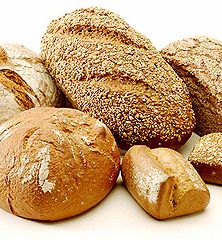 he study led by Emily D. Parker from HealthPartners Institute for Education and Research, HealthPartners in Bloomington, Minnesota and colleagues shows that those eating the highest amount of whole grain foods were 43 percent less likely to be diagnosed with type 2 diabetes compared with those eating the lowest amount.
he study led by Emily D. Parker from HealthPartners Institute for Education and Research, HealthPartners in Bloomington, Minnesota and colleagues shows that those eating the highest amount of whole grain foods were 43 percent less likely to be diagnosed with type 2 diabetes compared with those eating the lowest amount.The authors said in their report that "Whole grains may offer protection from diabetes by decreasing energy intake, preventing weight gain, and direct effects on insulin resistance."
About the study
Data used for the study came from 72,215 women who were free of diabetes at baseline enrolled in the Women's Health Initiative Observational Study. Whole grain intake was categorized "as 0, less than 0.5, 0.5 to 1.0, 1.0 to less than 1.5, 1.5 to less than 2.0, and 2.0 or more servings per day."
During a mean 8-year follow-up, 3465 cases of incident type 2 diabetes were identified. After adjustment for age and daily energy intake, the relative risk for type 2 diabetes was found at 1.00, 0.83, 0.73, 0.69, 0.61, and 0.57, respectively, meaning that those in the highest intake were up to 43 percent less likely to develop type 2 diabetes, compared with those with the lowest intake.
The risk reduction was more significant among nonsmokers and those who were able to maintain their weight within five pounds with higher intake of whole grains, compared with smokers and those who gained more body weight.
The researchers concluded "This large, prospective study found an inverse dose-response relationship between whole grain consumption and incident T 2D (type 2 diabetes) in postmenopausal women."





